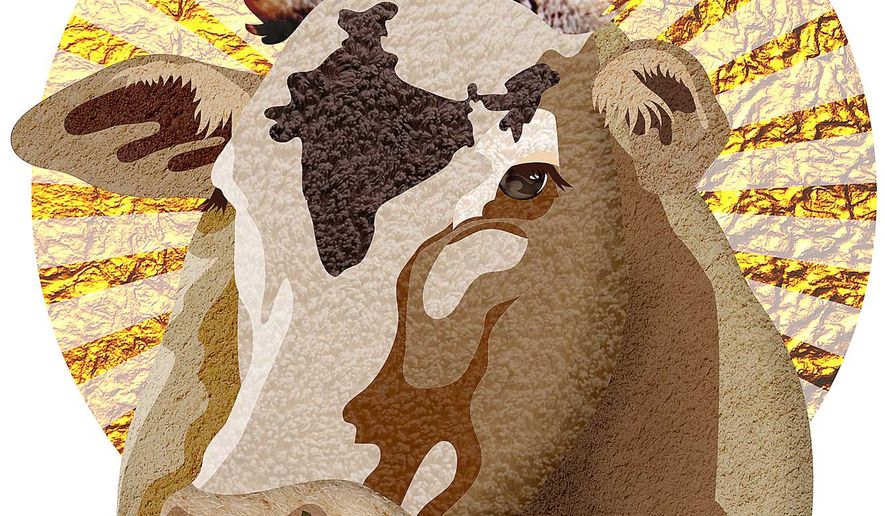OPINION:
India is in chaos again, but this time it’s because of cows. And it’s all happening during Prime Minister Narendra Modi’s world tour that’s underway this month.
It’s terrible timing for a prime minister aiming to show an India that’s moving forward and not backward. Yet some in his BJP Party are inclined to wander off in a direction of Hindu theocracy that restricts religious freedom and empowers religious radicals. One of the consequences is the global defamation of Hinduism by its own adherents.
The latest crisis began when India’s government announced a ban on the commercial transportation of cattle for slaughter, sending the world’s largest democracy into a frenzy. Overnight, the livelihood of millions of Dalits (sometimes called “untouchables”) and tribals, who survive on the beef, leather and bone industry, was destroyed, while millions of Christians and Muslims, who also consume beef and depend on cattle trade, found themselves confounded.
But the commotion doesn’t end there.
“Beef fests” have been called in defiance of the new law, while cattle traders and agriculture ministers have expressed no intention of stopping their business. An opposition leader, who had practiced vegetarianism for nearly two decades, abruptly broke his meat fast to protest the ban on beef. In March, one of India’s states introduced an amendment that would give life sentences to anyone who kills a cow; another is now calling for the death penalty.
There’s also turmoil within political parties.
A BJP Party leader of the Garo tribe of northeast India resigned in protest after fellow party members opposed his plans to organize a beef festival to celebrate Mr. Modi’s three years in office.
“What is the point of being part of a political party that does not want to keep our Garo tradition and culture alive? They cannot dictate us on our food habits,” he said.
Even the almost 100-year-old secessionist slogan “DravidNadu” was resurrected as a trending topic on Twitter. The Dravidians, a separate race from North India’s Aryans and whose food culture includes beef, in the past have called for the forming of an autonomous nation in South India. This trending topic is a huge concern for those of us who are committed to the unity and integrity of India.
To top things off, the ban could cost India $4 billion annually in beef exports and incur the loss of millions of jobs.
To be honest, these draconian laws that say the life of a cow is more valuable than the life of a human being make me wonder whether India is headed toward social self-destruction. And I’m not the only one who recognizes this: Hinduism’s most famous figure warned against imposing a beef ban in India.
In a prayer discourse in 1947, Mahatma Gandhi said, “In India no law can be made to ban cow-slaughter. I have been long pledged to serve the cow but how can my religion also be the religion of the rest of the Indians? It will mean coercion against those Indians who are not Hindus.”
Even the founder of the Hindutva movement — where modern Hindu nationalism finds its roots — was opposed to making the cow a national animal. He acknowledged that man was not made for the cow, but that the cow was made for man.
Mr. Modi openly confesses that he follows in the footsteps of Gandhi. He promised that he would work for an inclusive India, where Muslims, Christians, Hindus and every people from every culture, religion and language could coexist peacefully. He rightly and bravely condemned vigilantes who’ve publicly humiliated Dalits, and expressed his commitment to standing for India’s Dalits and tribals.
In the face of this nationally divisive campaign that is threatening the jobs and well-being of millions of Indians, Mr. Modi has the opportunity to once again step into the shoes of Gandhi and be a bastion of peace. He can stand for the diverse and prosperous India he and Gandhi envisioned, while respecting the religious views of those who feel compelled to not eat beef. If he doesn’t, then none of this fares well for India’s economy, security and social well-being.
If India is to truly to take her place as the world’s largest democracy — not just in name, but in practice — she must break free from the regressive forces that place one religious belief over another. Bans will not move India forward. But religious cooperation and friendship, intercaste marriages, and mutual respect for one another can take us to the India we all dream to live in.
In one line in that same speech in 1947, Gandhi delivered the message India needs to hear today. He said, “India belongs to all who live here.”
I agree with Gandhi: India belongs to every child, man, woman, Dalit, tribal, Muslim, Christian and Hindu who lives here.
• Joseph D’Souza is the moderating bishop of the Good Shepherd Church and Associated Ministries of India. He serves as the president of the All India Christian Council and is the founder and international president of the Dalit Freedom Network.




Please read our comment policy before commenting.